The War on Terror
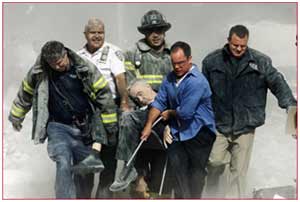
Rescue workers remove a victim from the Twin Towers on September 11, 2001.
The War on Terror
Since the September 11, 2001 terrorist attacks, or 9/11, U.S. foreign policy has been dominated by preventing and fighting terrorism. One month after the attacks, President Bush launched an invasion of Afghanistan, with heavy international support, to defeat Al Qaeda, the terrorist group led by Osama Bin Laden, and the Taliban government that protected them. Bush also announced what became known as the Bush Doctrine, making it known that the U.S. would carry out military operations on countries that harbor terrorists, and would act preemptively if necessary.
Read September 11, 2001 to learn more about the terrorist attacks.
War in Iraq
The first test of the Bush Doctrine occurred in 2003, when the U.S. led a small international force in Iraq called Operation Iraqi Freedom. Intelligence determined that Saddam Hussein, the leader of Iraq, had stockpiles of chemical weapons. These weapons had been banned since World War I. In a preemptive action the U.S. invaded Iraq to prevent the weapons from falling into the hands of terrorists. After the successful invasion Saddam Hussein was executed for his crimes.
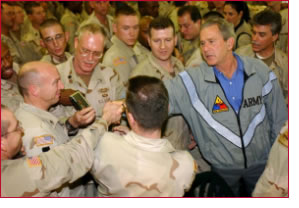
President George W. Bush paying a surprise visit to American troops at the Baghdad International Airport in 2003.
War in Iraq
Although most nations believed that Iraq had chemical weapons, no weapons were found. The situation in Iraq worsened from 2004 to 2007. President Bush announced a surge, or increase, of troops which improved the situation; however, he rejected announcing a withdrawal date.
Continued Threat in Iraq
After a long and controversial operation in Iraq, President Obama withdrew the last troops U.S. troops from Iraq in December 2011. However, the war on terror required U.S. intervention in Iraq once again by 2014. Without protection from U.S. forces, the Iraqi government was unable to protect cities throughout Iraq that the U.S. had previously fought for and gained.
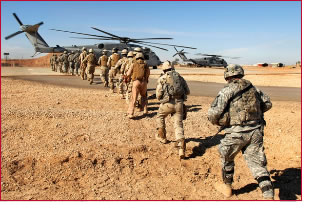
A joint US-Iraqi training exercise near Ramadi in 2009. The Islamic state of Iraq had declared the city to be its capital.
Continued Threat in Iraq
By the spring of 2014, the Al Qaeda operative, ISIL or ISIS, Islamic State of Iraq and Syria, terrorized citizens and regained many cities throughout Iraq. President Obama ordered U.S. airstrikes in Iraq and Syria in the fall of 2014 in an attempt to stop the terrorist organization ISIS from gaining control in Iraq.
Nuclear Proliferation
The war on terror is further complicated by the need to prevent nuclear proliferation, or the growth and spread of nuclear weapons. Since the fall of the Soviet Union, there has been a loss of control over its nuclear arsenal along with efforts of other nations to gain nuclear warheads. Some Russian scientists have sold nuclear technology to many isolated countries (N. Korea and Iran).
Nuclear Proliferation
The war on terror is further complicated by the need to prevent nuclear proliferation, or the growth and spread of nuclear weapons. Since the fall of the Soviet Union, there has been a loss of control over its nuclear arsenal and efforts by other nations to gain nuclear warheads. Russian scientists have sold nuclear technology to isolated countries (N. Korea and Iran). This poses a threat to U.S. national security in the form of direct attack or supplying these weapons to hostile groups. A Non-Proliferation Treaty was signed by approximately 189 countries including the five nuclear-weapons states, U.S., Russia, Great Britain, France, and China. Four others are known to have nuclear weapons, India, Pakistan, North Korea, and Israel. The U.S. also uses foreign aid (money) as a tool or incentive to prevent nuclear proliferation. Read The End of the Cold War to learn more about foreign policy in the 1980s and early 1990s.
Costs of National Security
Considering the impact of the war on terrorism, what are the financial, political, and social costs of national security? There is no simple answer to this question due to the multitude of factors and perspectives involved. Watch Foreign Policy, Terrorism, & September 11 (7:02).
Since the terrorist attacks on 9/11, a significant amount of our nation's resources have been allocated to improving national security. The attacks led directly to the U.S. war in Afghanistan. In addition, the war on terrorism led to preemptive action and the Iraq war. Sources in 2014 estimated the cost of the two wars had surpassed $5 trillion.
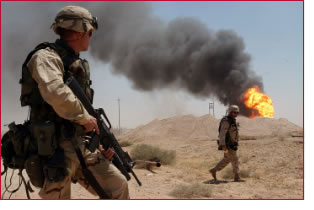
A U.S. soldier stands guard duty near a burning oil well in the oil fields of Iraq in 2003.
Financial Costs
Before 9/11, New York City's economy was above the national average. After 9/11, the city's economy severely constricted. The terrorists strategically hit the heart of America's financial market; however, the initial attack was just the beginning of the costs for our country. The financial costs involved in protecting Americans from another attack are almost impossible to calculate and could include everything from military costs and new security measures to foreign aid for countries that cooperate in the war on terrorism. Explore Cost of National Security to learn more about federal budget figures for national security.
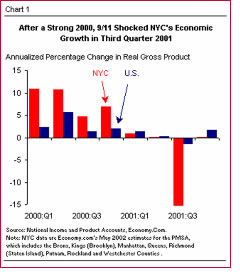
The image is a bar graph reflecting the devastating impact the 9/11 attacks had on the economy of New York City.
Social Costs
The political and social costs of national security have fluctuated over the years since the 9/11 attacks. The social costs are often followed by political changes and vice-versa. America has enjoyed great national unity in times of crisis and in times of victory like the capture of Saddam Hussein and Osama Bin Laden. However, we have also seen a sharp increase in our national debt which has led to an economic decline that directly impacts the everyday lives of Americans. Furthermore, traditional domestic priorities like education and civil liberties often take a backseat to the need to focus on national security measures to protect Americans.
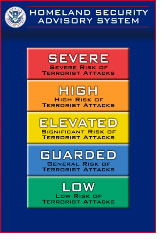
The image reflects the first Homeland Security Advisory System scale with severe (red) being the highest level and low (green) being the lowest level.
Social Costs
America, along with both Republican and Democratic Presidents, has enjoyed great national unity in times of crisis and in times of victory like the capture of Saddam Hussein and Osama Bin Laden. However, we have also seen a sharp increase in our national debt which has led to an economic decline that directly impacts the everyday lives of Americans. Furthermore, traditional domestic priorities like education and civil liberties often take a backseat to the need to focus on national security measures to protect Americans.
Political Costs for Republicans
The political climate concerning foreign policy and national security also seems to fluctuate. For example, immediately following 9/11, President George W. Bush led a unified America through one of her most difficult periods in history. For several years after 9/11, he had high approval ratings and was re-elected based on policies that greatly prioritized spending on national defense and security while putting less of an emphasis on social welfare and other domestic spending. Yet, by the time he left office, the wars had taken a toll on Americans and his approval ratings fell sharply.
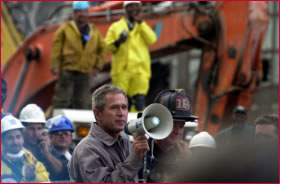
President Bush at the site of the World Trade Center disaster.
Political Costs for Democrats
President Barack Obama promised to end the war in Iraq when elected in 2008. He was extremely popular in his first term and won re-election in 2012. His agenda focused on sharp spending increases in social welfare and domestic spending and cuts to the defense and national security budgets. Similar to President Bush, President Obama experienced a steep decline in popularity during his second term evident by the republican sweep of Congress in the 2014 mid-term elections and low approval ratings from the American public.
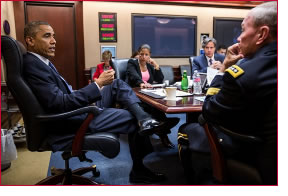
President Barack Obama meets with his national security advisors in the Situation Room of the White House in 2014.
So, will the political costs of national security and the war on terror negatively impact the legacy of these presidents? Only time can tell.